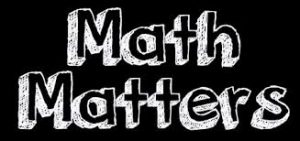COMMUNITY FEEDBACK REQUESTED BY NCDHHS – ADD MATH
November 19, 2018
The NC Department of Health and Human Services released a draft statewide Early Childhood Action Plan and is asking for community feedback in writing by November 30th. The goal of the plan is to improve early childhood outcomes across NC for children ages 0 – 8. Ten high level goals range from improving housing and hunger to health and academics. While it is encouraging to see reading included in the plan, (goal #10 is stated as “Grade Level Reading: Young children across North Carolina will read on grade-level in elementary school.”), it is surprising that math is not currently included as a goal. This document should ideally drive action across the state and so what is included (or excluded) matters.
Photo credit: www.cvcsd.stier.org
Here are some reasons it is important to include math in efforts to improve early childhood outcomes:
- School-entry math skills are predictive of later achievement in both math and reading – with an even higher correlation than school-entry reading skills. (Greg Duncan, et. Al, 2007)
- Only 40% of fourth graders in North Carolina are on grade level in math. (2017 NAEP)
- Math at age 7 impacts socio-economic status at age 42 (Source: Ritchie & Bates, Enduring Links From Childhood Mathematics and Reading Achievement to Adult Socioeconomic Status, 2013)
The Early Childhood Action Plan can be found here: https://files.nc.gov/ncdhhs/ECAP-Draft-11.01.18.pdf
Community members are invited to go on record requesting that math be incorporated as a high-level goal along with reading (“Grade Level Reading AND Math”) by emailing ECAP@dhhs.nc.gov.
EXAMPLE FEEDBACK:
Dear NCDHHS –
I saw a copy of the Early Childhood Action Plan and want to urge you to include math in goal #10 (“Grade level reading and math”). Math is critical to academic confidence, high-school graduation, and post-secondary and employment options, and skills must be developed early. Here are some additional stats:
- School-entry math skills are predictive of later achievement in both math and reading – with an even higher correlation than school-entry reading skills. (Greg Duncan, et. Al, 2007)
- Only 40% of fourth graders in North Carolina are on grade level in math. (2017 NAEP)
- Math at age 7 impacts socio-economic status at age 42 (Source: Ritchie & Bates, Enduring Links From Childhood Mathematics and Reading Achievement to Adult Socioeconomic Status, 2013)
In early years, math and literacy skills are closely tied (executive function skills, language that organizes/categorizes/describes, ordering and quantities). Please make sure families, educators, and community leaders know how important both subjects are to success and that neither subject is left behind – at children’s detriment.
Thank you.
Categories
- Blog (252)
- Events (28)
- Grants and Funding News (33)
- Heart Families (9)
- Heart News (152)
- Heart Staff (16)
- Math Matters (38)
- Press (65)
- Student Spotlight (1)
- Uncategorized (43)
- Volunteer Partners (12)
- Volunteer Resources (41)
- Volunteer Spotlight (52)
Recent Posts
- 2025 Volunteer Appreciation Month Spotlight Series
- Tutor Spotlight: LaShurn Purnell
- 2024 NAEP Results
- Heart Featured on Charleston’s Live 5 News
- Racing to 100 Tutors Across the Carolinas!
- Accelerate and Johns Hopkins University Visit HMT Tutoring Session
- Tutor Spotlight: Libby Anderson
- Tutor Spotlights: Alyson and Michael Fotia
- Heart Featured on Winston-Salem’s WXII 12 News
- Volunteer with Heart!


